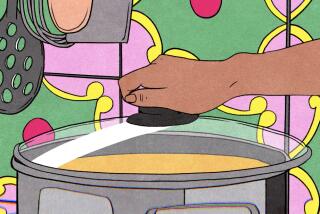A Refreshing Selection of Words and Beauty
- Share via
Although I have loved poetry ever since I first encountered it, there was a time when reading contemporary poets was not my idea of fun. It was a dismal scene, filled with seemingly infinite varieties of uninviting verse: from the pretentious and obscurantist to the formless and self-indulgent. Recently, however, the situation seems to have brightened. We now find among us once again poets who enjoy their freedom and use it to take on the discipline of form, poets more interested in writing clearly of complex things than in dressing up the obvious and the paltry in deliberately mystifying mannerisms.
The poetry of Lucia Perillo is a case in point. Her latest collection, “The Oldest Map With the Name America,” is an excellent introduction to her work, offering seven poems from her 1989 debut volume, “Dangerous Life,” another 17 from her 1996 “The Body Mutinies” and 29 previously uncollected new poems.
Many of the poems draw on memories of growing up in an Italian American neighborhood in New York. As Perillo wryly observes in one of the new poems, “Beige Trash,” her native ground was not, on the surface of it, the kind of soil conducive to the growth of a poet. Unlike Southern writers of the Agrarian school, she had:
no tent revivals, no cousins with red hair
and freckled hands, no words as exotic as po’boy
or chifforobe or muffaletta. Which meant
we had no means to wrangle Beauty
into the cathedrals of our mouths . . .
But, beauty can be found everywhere, and the poet’s business is not only to take note of it, but to seek out its ramifications. In “Home,” Perillo first contemplates the idealized landscapes in the backgrounds of Italian Renaissance paintings (“A pastoral elsewhere . . ./ When we know what’s really outside the window--Florence’s open sewers . . .”), then turns our attention to a spot on the north shore of Queens:
And if you stand at the parking lot’s
western edge on cloudless days, you see tall peaks
tinted by distance, with nothing else in the landscape
to match their shades . . . Of course
when you get there, the mountains are never purple
. . . But from here
doesn’t there look romantic, aren’t you shanghaied
by its Shangri-la, and don’t you start thinking
about the Kennedy administration, doesn’t it make you feel
like being kissed?
Perillo’s themes include the mysteries of perception, sensation and memory; the oddity of language, human relationships, the relationship between mind and body; and, as she puts it, “love’s faulty hermeneutics: the muffler in retreat/ mistaken for the motor coming, the declaration/ of loathing construed as the minor reproach . . .” She uses colloquial language and down-to-earth imagery in a way that is both engaging and elegant. Seldom if ever cheap, her ironies are carefully honed and often directed against herself.
In her poem “Limits,” recounting an experience she had as a park ranger in a wildlife refuge, she describes her unwillingness to administer mouth-to-mouth resuscitation to a decrepit man who had collapsed in her presence:
I know there are people . . .
who’ll rush into burning buildings to save the lives
of strangers. But every time I ponder selflessness
I hear the beats of my heart, that common loon,
most primitive of birds. Then life seems most
like a naked, frail thing that must be protected,
and I have suddenly become its mother, paddling
furiously with my own life saddled on my back.
Perillo’s cool intelligence, her understated but irrepressible sense of humor and the overall felicity of her diction may remind some readers of the plangent, bell-toned voice of Elizabeth Bishop. But Perillo, while perhaps less subtly ingenious, is also less coy than Bishop can sometimes be. Her directness is distinctly refreshing.
More to Read
Sign up for our Book Club newsletter
Get the latest news, events and more from the Los Angeles Times Book Club, and help us get L.A. reading and talking.
You may occasionally receive promotional content from the Los Angeles Times.









